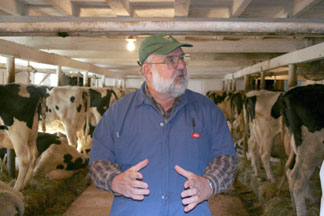Cornell alumnus investigates TB in cows in Siberia
By Krishna Ramanujan

When Roger Ellis '73, DVM '77, saw that an international volunteer farmer-to-farmer program needed a veterinarian to assist with a surprising rise of tuberculosis (TB) in dairy cattle in Siberia, he jumped at the chance.
What Ellis found during his three-week trip this past October was that the rise in bovine TB, a disease that has spread to humans, is indirectly the result of an unfavorable political climate for farmers and a lack of essential government support since the breakup of the Soviet Union in the early 1990s.
Ellis, a field veterinarian with the New York State Department of Agriculture and Markets, Division of Animal Industry, is yet another Cornell alumnus working on local issues of global importance. His assignment through the Agricultural Cooperative Development International/Volunteers in Overseas Cooperative Assistance, which is funded by the U.S. Agency for International Development, was to consult on diagnostic and treatment methods for TB. His job in New York is to monitor bovine TB and other cattle diseases.
In one large dairy farm Ellis visited in the Novosibirsk region in southwestern Siberia, TB had decimated a herd of milking cows from 1,200 in 2002 to 430 currently. While Siberian veterinarians eradicated the disease in cattle from 1976 to 2000, it re-emerged around 2002. And, in the last year alone, 17 human cases of the disease were reported in the county where the farm is located.
"One theory is that TB could have been brought in to the farms by returning prisoners from Siberia," said Ellis, noting that some released prisoners returned in 2001 to work on the farm Ellis visited. "TB is a slow-acting, insidious disease that may not show signs for a number of years after exposure," he added. Another theory was that TB-contaminated, unpasteurized byproducts from the farm's cheese-making plant were used as supplemental feed.
On the farm next to the one where Ellis primarily worked, the deadly strain of avian flu (known as H5N1) that has grabbed the world's attention struck the poultry flock and forced the farmer to depopulate. While the government subsidized the farmer for lost poultry due to the H5N1 outbreak, the same farmer has received no compensation for his TB-stricken cattle.
One of the issues that Siberian veterinarians voiced repeatedly to Ellis was that since the breakup of the Soviet Union in 1992, the country is too poor to subsidize farmers when they lose cows to TB.
The old Soviet policy, similar to current U.S. practice, reimbursed farmers for exterminated cows that tested positive or were suspected of having TB. This allowed farmers to purchase new cows and to depopulate entire herds to prevent the disease from spreading. But now in Siberia, "it's a slow death to the farms," said Ellis, as farmers cannot afford to depopulate entire herds, allowing TB to pick off one cow at a time. And in a vicious cycle, because farmers are poor, they are also killing their cattle to eat.
"Once TB gets into a herd, it is almost impossible to get rid of," said Ellis. "It is interesting that somehow the government of Russia was able to get money to pay for birds to be depopulated but they cannot get the money to deal with a disease that is very real, that is slow-moving and that we know is a problem. In Siberia, TB is coming back, and the farmers and veterinarians are not getting the support."
Ellis, who lives in Granville, N.Y., is also the president of the board of directors of Washington County's Cornell Cooperative Extension.
Media Contact
Get Cornell news delivered right to your inbox.
Subscribe